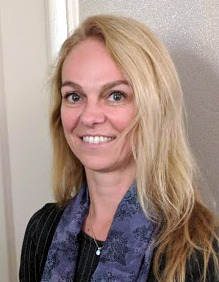At the recent Electronics Reuse Conference, Shauna L. McCaffrey of Renewed Computer Technology received the 2018 Jim Lynch Hall of Fame Award. The award recognizes her for lifetime achievement in the refurbishment and ITAD industry.

Shauna McCaffrey
Receiving a memorial Jim Lynch Hall of Fame Award this year was Lane Epperson, who founded Oklahoma City-based HiTech Assets 16 years ago. Epperson died on Sept. 30, 2018 at the age of 56.
Following the event, Jim Lynch, a longtime electronics reuse advocate and founder of nonprofit group TechSoup, interviewed McCaffrey, who is the Executive Director of Renewed Computer Technology (RCT). TechSoup is a nonprofit network of organizations that provides technical support and technology tools to help other nonprofit groups.
Lynch: How did you happen to get into the field of charitable PC refurbishment?
McCaffrey: Just over 12 years ago I was an executive in the telecom industry and read about Renewed Computer Technology (RCT) in Ontario. I decided that I wanted to bring my business skills from industry to bear upon the triple bottom line missions of digital equity, youth empowerment and protecting the environment. I applied for the job to run RCT and have been there ever since. I truly thrive on empowering others – both organizations and individuals. Ingrained in my mind is the 6-year-old refugee who hugged his donated laptop, the teenager whose home just burned down who proudly claimed “now my family owns something” or the youth at risk who used his first laptop to start a business against all odds. That’s why I do this work and continue to fight for this industry to thrive.
What are a few things that have changed for you and the field in the last 12 years or so that you’ve been running RCT?
A lot has changed! Not-for-profit organizations were not recognized as part of the recycling industry when I started and there were no standards in that industry for doing recycling and refurbishment reputably. RCT is the largest program in the Computers for Schools Canada project, and we got to lead several efforts to enlarge and secure funding for the work of supplying refurbished computers nationally to all who need them.
I spent countless hours in negotiations and doing committee work to rally the IT and recycling industry in Ontario around reuse standards. We developed the first ones in the world. They were adopted by the Ontario Ministry of Environment’s WEEE Program. My mission was to ensure that electronics reuse plays a prominent role in the program. The goals I wanted to achieve were:
- Reuse needs to be integrated into all levels of any diversion program.
- Reuse needs to be encouraged and incentivized. Far too many discarded IT devices were going straight to end-of-life recycling when the program started. It is better now but not perfect.
- Not-for-profits and charities should benefit by the program as they primarily reuse and provide social, economic and environmental benefits.
The Ontario Government at the time supported this view, and reuse was integrated into an electronics recycling system for the first time anywhere. These goals have since been adopted in several other places.
The other thing I’m proud of is that we secured permanent government funding for RCT and Computers for Schools Canada. This work involved countless hours of negotiations and gaining mutual understanding for the best outcome. Our successful charitable reuse programs had faced the threat of funding cuts and curtailment over the years. I wanted to help fix that. I think we managed to do that. Now after 12 years, lots of companies and governments have gone away, but RCT and the Computers for Schools Canada program remain, as do the reuse standards.
Can you tell us more about the Computers for School Canada program?
Computers for Schools Canada (CFS) is a project of the Canadian federal government’s Innovation, Science and Economic Development Canada. CFS has refurbished donated computers and distributed them to schools, libraries, not-for-profit organizations, indigenous communities and eligible low-income Canadians across Canada for the last 25 years. It is the largest and most comprehensive charitable computer reuse project in the world. Industry and government donate their retired IT equipment to the program and the CFS Affiliates across Canada. The equipment is remanufactured by youth interns and then donated to those who need it – thereby equipping youth with hands-on work experience to pursue their careers in IT.
Since 1993, over 1.5 million computers have been refurbished and distributed across Canada, increasing access to technology and digital skills for Canadians so they can thrive in a knowledge-based economy. In collaboration with the Government of Canada and under its leadership, CFS significantly contributed to projects such as #WelcomeRefugees, providing computers to refugee families. And, most recently, it has contributed to the Connecting Families initiative, which aims to provide 50,000 computers and $10 internet access to low-income families.
What are some of your other accomplishments at RCT?
Here are a few accomplishments of RCT and what we are proud of:
- RCT has grown into a social enterprise that balances business operation expertise with truly delivering on its social outcomes.
- RCT now works collaboratively with over 80 social organizations to deliver on our vision of expanding minds by extending technology to our mutual benefits across Ontario.
- Youth interns make up over 50 percent of our workforce at any given time, which truly supports our mission and social outcomes.
- RCT is set to provide 20,000 computers to support Connecting Families.
- We support so many needs in our communities – from bring-your-own-device programs in schools, to learning programs for disadvantaged individuals, to low-income housing tenants. There are so many great outcomes that we can say “We do that!”
- One of my favorite projects: RCT, along with volunteers and the City of Toronto, helped disadvantaged youth in high-risk neighborhoods start their own businesses. Business mentors provided one year of training in business planning, as well as bus passes and many other services. If participants successfully pitched their plan, they received a low-interest business loan. All 10 youth participants were successful in launching businesses!
These are the impacts of the reuse industry, what RCT can achieve along with its partners and dedicated team, and I am proud of our work and for being recognized with the Hall of Fame Award. It’s truly an honor.
More stories about refurbishment/reuse
- Closed Loop enables eastern US electronics recovery corridor
- Companies set to boost US rare earth magnet recycling
- Makor ERP to incorporate ESG reporting into platform



